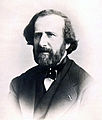Karl Gustav Himly
Karl Gustav Himly (* April 30, 1772 Braunschweig, † March 22, 1837 Göttingen ) was a German surgeon and ophthalmologist.
Biography
Karl ( also: Carl ) Gustav Himly was born the son of the Privy Cabinetssekretärs Himly at Brunswick court and was the younger brother of Johann Friedrich Wilhelm Himly ( 1769-1831 ).
Himly began his studies in 1790 at the Julius- Maximilians- University of Würzburg with Karl Kaspar von Siebold. Since 1792 Himly studied at the Georg -August- University of Göttingen in August Gottlieb Richter and in 1794 his assistant. On September 6, 1794, he received his doctorate with his work then Dissertatio inauguralis medico - practica observationes quasdam about epidemiam huius anni dysentericam sistens [ ...] ( 1794). 1795 he was appointed professor of medical- surgical hospital in Brunswick. In 1801, took over Himly - as the successor of Christopher William hoof - Professor of Medicine at the Clinic for Internal Medicine at the University of Jena. Since 1803 Himly lectured at the University of Göttingen then Theoretical and Practical Surgery and taught - for the first time in Germany - in the subject Ophthalmology ( Ophthalmology ). Himly has several ophthalmic instruments specified and introduced the mydriatic ( pupil expanding agent) in ophthalmology. Among his students were Karl Friedrich von Heusinger, Maximilian Joseph von Chelius, Dietrich Georg Kieser, Wilhelm Baum, Peter Krukenberg, Georg Hartog Gerson and Ernst Alban.
The publication of the first German ophthalmologic journal under the title Ophthalmic Library began Karl Himly 1802 together with his Viennese colleagues Johann Adam Schmidt ( 1759-1809 ). By 1805, three volumes were realized, after the show was interrupted until 1816. A resumption of activity as editor ended 1819. His international reputation as a specialist led to Niccolò Paganini went to see him at the edge of a concert in Göttingen on May 25, 1830 due to eye problems.
1805 Himly was appointed Director of the Academic Hospital in Göttingen, where he joined the ambulance to the hospital by his teacher judges. During this time there was a collaboration with Konrad Johann Martin Langenbeck, which ended around 1808. It was created in 1809 a new clinic that Himly directed until 1814.
Himly served in the hospitals of the Prussian army on the Rhine.
Himly died from a fall in the line, was suspected a suicide. The exact circumstances remained unclear.
His son Ernst August Wilhelm Himly (1800-1881), the posthumously published in 1843 a textbook of his father, was a Professor of Physiology, Comparative Anatomy and Forensic Medicine in Göttingen. His son August Friedrich Karl Himly (1811-1885) was a chemist and professor at the University of Kiel.
Writings (selection )
- Mortis causa et signa, Göttingen 1794
- Discussion of the effect of the disease stimuli to the human body. Inaugural lecture in Braunschweig. Thomas, Braunschweig 1797.
- Introduction to ophthalmology. Jena 1806; 3rd edition of Göttingen 1830.
- Textbook of practical medicine. First part containing general nosology, Teaching remedies and therapy. Self- Verlag, Göttingen 1807 ( 2nd edition 1816).
- Malformations and diseases of the human eye and its healing. After the posthumous papers issued thereof and provided with additions of EAW Himly. Hirschwald, Berlin 1843.
He gave the following journals ( with ) out:
- Ophthalmic library. Edited by Johann Adam Schmidt. Frommann, Bonn 1803-1807, 3 vols.
- Journal of practical medicine. Edited by Christopher William hoof. From 1809 to 1814.
- Ophthalmic library. Knowledge and treatment of the senses at all. Hahn, Hanover 1816-1819, Vol 1
Awards
- Academic Prize in Medicine in the University of Göttingen in 1794 for his writing Mortis causa et signa
- Knight of the Order of the Guelphs Kingdom of Hanover (1820 )










